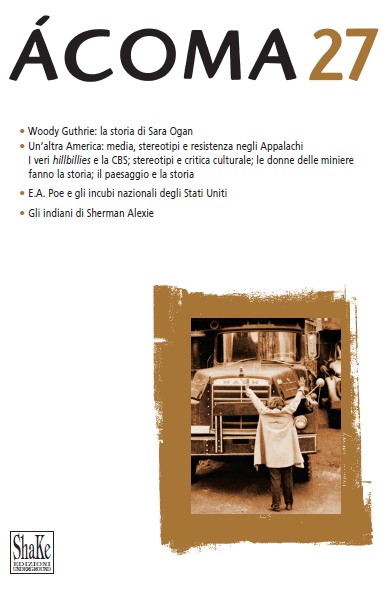Tu sei qui
Un’altra America: media, stereotipi e resistenza negli Appalachi
Numero 27
Estate-Autunno 2003 - Anno IX
 Woody Guthrie: la storia di Sara Ogan
Woody Guthrie: la storia di Sara Ogan
 Un’altra America
Un’altra America
 E.A. Poe e gli incubi nazionali degli Stati Uniti
E.A. Poe e gli incubi nazionali degli Stati Uniti
 Gli indiani di Sherman Alexie
Gli indiani di Sherman Alexie
Un’altra America: media, stereotipi e resistenza negli Appalachi
Non vedevamo sconosciuti, allora. La vita di Maud Jenkins - p.4
I veri hillbillies e la CBS: storia di una battaglia - p.14
In 2002, CBS began searching for the ideal family for a new show: a reality-show version of its earlier successful sit-com, The Beverly Hillbillies. The idea was to take a rural family – low income, isolated, un-traveled, uneducated – and dump it in a mansion in Beverly Hills, expecting all sorts of hilarious consequences. A number of individuals and groups felt that this would perpetuate stereotypes that were offensive to rural America and its people. The Center for Rural Strategies, a small local organization in Whitesburg, Kentucky, launched a campaign to stop the project. The article tells the story of how this campaign was waged on national media, and how it gained the support of unions, civil rights activists, rural spokespersons, and finally succeeding in CBS shelving (albeit “temporarily”) the project.
Da dove vengono gli hillbillies? Fonti e storie del comic fool appalachiano - p.25
The author goes over the history of the fool’s role and figure – intended both as medieval jester as well as silly and naive person – in connection with the image of the fool in 1970s TV shows about Appalachian coarse mountaineers people such as The Beverly Hillbillies. Sandra L. Ballard, herself a native Appalachian, also deals with the analysis of the stereotype strictly connected to this image.
L’Appalachia risponde: stereotipi e critica culturale in una regione americana - p.35
In his essay, the author challenges Robert Schenkkan’s Pulitzer Prize-winning play, The Kentucky Cycle, criticizing its reinstatement of stereotyping Appalachia and its peoples as well as pointing out the frequency and impunity of the use of Appalachian stereotypes in writing and popular media. Billings offers an overview of past and recent research on the social and economic history of Appalachia and its population, in contrast with the simplistic and monolithic versions of the region’s past, based on the commonplace notion that its culture was the product of continuing frontier isolation.
Pike County, Ky.: le donne delle miniere fanno la storia - p.46
The author relates the events that brought to the strikes of the Pikeville Methodist Hospital in Pike County and of the mine at Brookside, both in Kentucky and their outcomes. Starting from the stereotypes that represented the Appalachian woman as a passive hillbilly, she reports, through the personal experiences of the strikers, the difficulties these women had to face and the fundamental contribution they paid to the cause.
Senso del luogo, sublime ecologico: il non-paesaggio in Appalachia - p.62
The article explores the stylistic and ideological modes whereby G. C. Jones’s autobiography Growing up Hard in Harlan County constructs a sense of place which eschews the stereotyped, sentimental landscape code of the local color school, as well as the commodifying and dehumanizing approach of the geographical and anthropological sciences traditionally committed to the representation of Appalachian nature. By highlighting the connection between the oblique treatment of landscape and the non-contemplative and pragmatic relationship to the land, which mark the author’s work activity and life experience, the article positions the book within the tradition of a post-industrial environmentalism whose cultural matrix can be traced back to EuroAmerican Romantic ecology.
Emerson, l’Appalachia, la storia: Generations di John Egerton - p.73
The article explores how history writing, storytelling and narration are interwoven in John Egerton’s Generations: An American Family, set in Appalachia, from the point of view of the ongoing debate about the truthvalue of historical narratives, and especially of storytelling. A multivocal book, made up of different discourses ranging from cultural history, oral history, local color, fiction, and sociology, Generations reads an Appalachian story as a “metaphor of America” through a series of metonymic shifts that reveal the influence of the Romantic and Emersonian notions of history and representativeness.
Testo a fronte
La storia di Sara Ogan - p.86
Intervista
Intervista a Janet Campbell Hale - p.93
Saggi
Incubi nazionali di Poe - p.102
Da Atopia a Utopia: gli indiani interstiziali di Sherman Alexie - p.117
In his novel Indian Killer, Sherman Alexie focuses on the American Indian urban experience. He describes the “pan-indian” tribe of Seattle as a community of “homeless warriors” capable of grouping together and fighting for its own survival. By insisting that any struggle for justice must begin by seeing society from what theorist Slavoj Zizek has described as the point of view of its “abject” – the crowds of the homeless, the illegal immigrants of the contemporary metropolis – Alexie imaginatively rescues his urban Indians from a destiny of suffering and alienation. The true homeland of Alexie’s urban Indians is not what some postmodernist thinkers describe as the “a-topia” of the contemporary metropolis, but Utopia.

